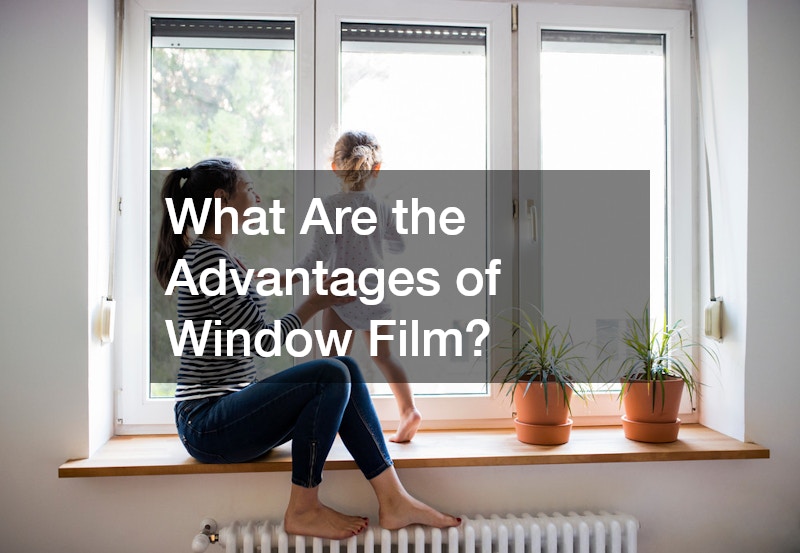Window film is becoming an increasingly popular option for both residential and commercial properties. This article explores the various advantages of window film and answers some of the most frequently asked questions about its uses and benefits.
How Does Window Film Improve Energy Efficiency?
Window film significantly reduces heat gain through its reflective and absorptive properties, making it an excellent choice for energy efficiency. By minimizing heat transfer, window films help maintain a comfortable indoor environment during hot summer months. Consequently, property owners can see a noticeable decrease in cooling costs as their air conditioning systems are not overburdened.
Beyond its heat-reducing capabilities, window film serves as an additional layer of insulation on your windows. This extra layer aids in stabilizing the internal temperature of a building, ensuring comfort during both hot and cold seasons. Thus, window film not only keeps heat out in the summer but also retains interior warmth during winter.
The reduction in unnecessary heat exchange directly affects the property’s overall energy consumption. With window film, HVAC systems operate more efficiently, lowering electricity bills and reducing carbon footprints. This sustainable approach supports the growing demand for environmentally friendly energy solutions.
What Are the Benefits of Window Film for Privacy?
There are a multitude of privacy films available, each varying in opacity and design to meet specific needs. From frosted films that obscure vision without blocking light, to darker tints that offer maximum concealment, the options are diverse. Selecting the right film can balance privacy and light, ensuring privacy is not compromised.
Privacy window films are invaluable in both homes and offices, where they discreetly enhance privacy without sacrificing natural light. In residential settings, they secure private areas while maintaining a bright and airy feel. In commercial environments, privacy films are essential in areas like conference rooms, providing a confidential atmosphere conducive to business discussions.
Unlike curtains and blinds that can obstruct views and light, window films provide a seamless and aesthetically pleasing alternative. Films are easy to maintain, do not collect dust, and offer a sleek, modern look. When compared to traditional treatments, window films are versatile and often result in a more professional finish.
Can Window Film Protect Against UV Rays?
Prolonged exposure to ultraviolet (UV) rays can cause significant damage to furnishings, artwork, and flooring by fading colors and deteriorating materials. Additionally, UV exposure poses health risks, contributing to skin aging and increasing the potential for skin cancer. Installing window films can mitigate these damaging effects by acting as a UV barrier.
Window films designed for UV protection can block over 99% of harmful UV rays, dramatically reducing exposure from the sun. This protection is crucial for safeguarding both interior spaces and the well-being of building occupants. With data supporting their effectiveness, UV protection films are a compelling choice for those looking to preserve their property and health.
Over time, using UV protection films can result in significant financial savings by preserving valuable interior assets. By protecting furnishings and flooring from UV damage, replacement needs and associated costs are minimized. Furthermore, reducing UV exposure enhances health outcomes, emphasizing the benefits of investing in protective window film.
How Does Window Film Enhance Security?
One of the remarkable attributes of window film is its ability to hold shattered glass together. This property is particularly beneficial in the event of break-ins, accidents, or natural disasters. By reducing the risk of injury from flying glass shards, window films provide an added layer of safety and security.
Areas susceptible to hurricanes, earthquakes, or frequent vandalism can greatly benefit from the enhanced security offered by window films. By bolstering glass strength, these films reduce the likelihood of windows collapsing under impact or pressure. This added durability is vital for both residential and commercial properties in high-risk areas.
Window film can be seamlessly integrated with existing security measures, enhancing overall protection strategies. When paired with alarms, security cameras, and reinforced doors, window films provide a comprehensive security solution. This layered approach is effective in deterring potential intruders and ensuring peace of mind.
Are There Aesthetic Benefits to Using Window Film?
Window films are not just about functionality; a wide variety of decorative designs and patterns are available to suit any aesthetic preference. From geometric patterns to custom designs, these films allow property owners to personalize and enhance their spaces. This customization extends to corporate branding, where logos and thematic elements can be incorporated into window design.
Window films provide a unique opportunity to blend style with function, harmonizing with any interior aesthetic. Decorative films offer a chance to experiment with creative designs while maintaining the energy efficiency and privacy benefits of traditional films. This flexibility in design ensures that spaces remain visually appealing and functional.
Window film offers a multitude of advantages, from enhancing energy efficiency and privacy to providing UV protection and aesthetic improvements. By understanding these benefits, homeowners and businesses can make informed decisions about incorporating window film into their properties. As adoption of window film continues to grow, its value as a versatile and beneficial property enhancement stands firmly substantiated.




